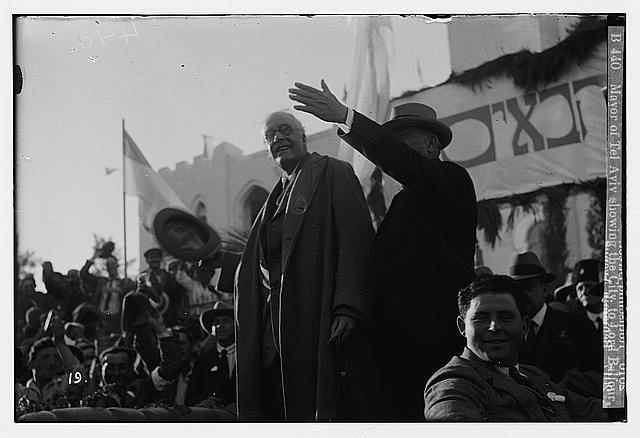Thriller set in Bangkok and Ko Samet
Talking to author David Cronin about “Balfour’s Shadow” – Middle East
19th October 2017
 Journalist David Cronin was at the Guildford Book Festival last week, talking about his latest book: Balfour’s Shadow – A Century of British Support for Zionism and Israel.
Journalist David Cronin was at the Guildford Book Festival last week, talking about his latest book: Balfour’s Shadow – A Century of British Support for Zionism and Israel.
‘Britain’s foreign secretary penned the Balfour Declaration in 1917, laying the foundations for the creation of Israel in historical Palestine. In his revealing study, David analyses the motives behind British foreign policy and its consequences for both Palestine and Israel through to the present day. It is a timely reminder of Britain’s role in this ongoing conflict.‘
David kindly agreed to answer a few questions from TripFiction about his work and about the Middle East he analyses so well.
TF: TripFiction allows a reader to search for books with a strong sense of place, allowing them to see a location through an author’s eyes. Apart from your own, which books – novels, memoirs, biographies or travelogues – do you think best evoke Palestine and Israel for the reader?
DC: The best memoir I have read about the Palestinian experience of dispossession and exile is ‘In Search of Fatima‘ by Ghada Karmi. Selma Dabbagh’s novel ‘Out of It’ gives a good sense of what life is like for younger Palestinians. For more of a travelogue, I would recommend ‘I Saw Ramallah’ by Mourid Barghouti.
TF: And can you please give us an overview of the themes and tone of Balfour’s Shadow and the conclusions you reach?
DC: The book examines the legacy of Arthur James Balfour. As Britain’s foreign secretary in 1917, he issued a pledge to support the objectives of the Zionist movement. Through the Balfour Declaration, as that pledge became known, Britain became the imperial sponsor of a Jewish state that would be established in Palestine.
My book pays particular attention to how Britain nurtured Zionist colonisation when it ruled Palestine between the two world wars.
The centenary of the Balfour Declaration falls this year. Theresa May has promised to mark that occasion with pride. My book argues that she should not be proud of Britain’s history in Palestine.
The tone of my book is passionate, I would like to think. But I don’t think my passion distracts from the fact it is a serious work, based on a careful study of British state archives. The passion, I hope, will help the reader understand that this history is of painful relevance to today’s world.

Photo: https://commons.wikimedia.org
TF: You are a journalist and political activist living in Brussels, but your area of real expertise – and the subject of your most recent books – is the Middle East. What first fired your passion to understand more about this troubled area, and do you think Europe could interest you as much in the coming decades…if it doesn’t already?
DC: The first time I was in Palestine was in 2001. I was deeply shocked by the oppression of the Palestinians that I witnessed.
I would argue that examining the Middle East from my adopted home of Brussels is more logical than it may seem at first. The two books I have written about Palestine are really about Europe’s responsibility for the situation. I have spent years reporting on the European Union and became a little burnt out from doing so. But I still follow EU politics closely, particularly the development of EU foreign policy.
TF: I believe you hail from Ireland, David? Can you please tell us which Irish writers and books you enjoyed reading while in your formative years? And which other authors might have helped to instill in you the strong sense of activism which drives you today?
DC: To be honest, I only really started reading political books in my twenties and thirties. I am 46 now. During my adolescence – if that’s what you mean by formative years – I was more interested in music than literature. Some of the Irish singers that influenced me were very political and I guess you could argue that they were poets in some respects. People like the folk singer Christy Moore. My favourite singer is Shane MacGowan of The Pogues. I remember reading a book of his lyrics in my teens and was blown away by them. MacGowan really captured the experiences of the Irish community in London. There is a great energy and a dark humour to his work.
The best political writers I have read are Naomi Klein, Ilan Pappe, Arundhati Roy, John Pilger and Edward Said.
TF: Can you please share with us which other long-form projects you’re working on at the moment, the theme of your next book and in which ‘theatre of action’ it might be based in?
DC: I have not started working on my next book yet. I promised my family that I would not rush into another major project once ‘Balfour’s Shadow’ was completed.
TF: Tony Blair was a Middle East peace envoy from 2007 to 2015. How do you think history will judge his time in that role, and do you think it would be an interesting book to write?
DC: It is obscene, to put it quite politely, that a man who destroyed Iraq along with his pal George Bush could be described as a ‘peace envoy’. We should bear in mind, too, that Blair was appointed a ‘peace envoy’ on the same day that he stepped down as Prime Minister in 2007.

David Cronin
The truth is that historians tend to be quite conservative and pro-establishment – with some exceptions, of course. Though history ought to judge Blair very harshly, it would not surprise me if historians try to sanitise his record. That is what tends to happen. I have recently read a number of books about Arthur Balfour. Some of them present Balfour as a great intellectual and statesman. His role in dispossessing the Palestinians has been downplayed or, in some cases, treated as a mere footnote.
TF: Thank you so much, David, for taking the time to talk with TripFiction about this important new book, and about your writing life, in such an interesting and honest way. Good luck with your next project….whenever it might be, and wherever it might take you and the reader.
You can follow David on Twitter
Do come and join team TripFiction on Social Media:
Twitter (@TripFiction), Facebook (@TripFiction.Literarywanderlust), YouTube (TripFiction #Literarywanderlust), Instagram (@TripFiction) and Pinterest (@TripFiction)

 Please wait...
Please wait...

About 15 years ago we were holidaying in Cyprus and took a trip to Israel to see Jerusalem and Bethlehem. On the drive up after we docked, we were terribly shocked to see the contrast between the standards of housing and amenities on the two sides of the road. It wasn’t hard to see why the Palestinians had such a sense of grievance.
Definitely a book to go on my reading list. Oddly, our cruise ship is docked in Haifa and we drove on Balfour street yesterday.